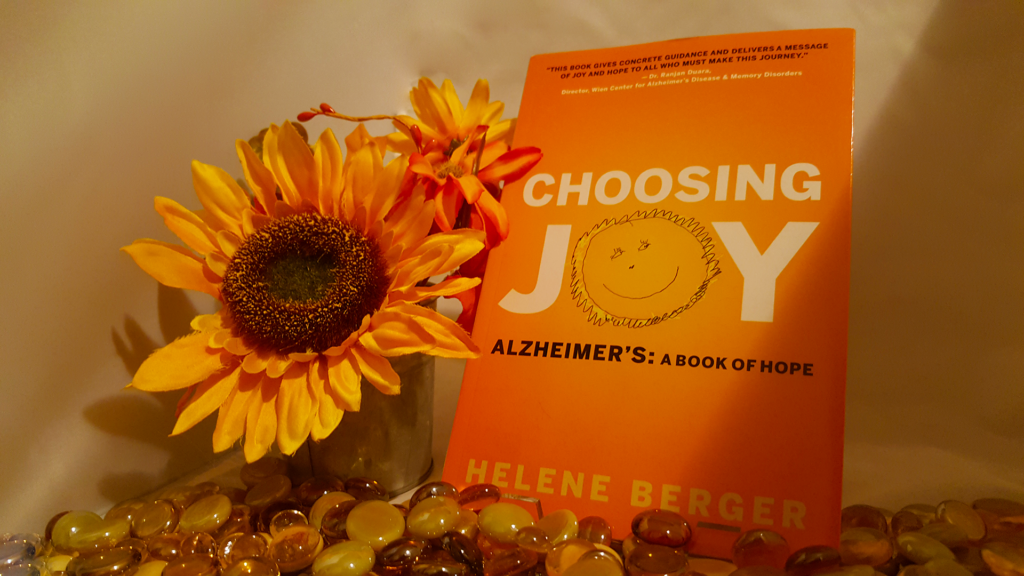
Dealing with a sudden life change is never easy, and it hurts more whenever we see it affect someone that we dearly love. In “Choosing Joy – Alzheimer’s: A Book of Hope”, what I loved about Helene Berger’s journey through helping her late husband through Alzheimer’s disease is that she full-heartedly documented ways to positively help the one we’re caring for, not just physically, but mentally and emotionally. It’s common to find “warnings” in books, online, the doctor’s office, and from friends on what to expect and to mentally accept from someone who has developed Alzheimer’s, but just because many of these actions might eventually occur does not mean that we have to blindly allow these changes to develop into irreversible habits.
Many thanks to Smith Publicity Inc. for sending me this book to read. Although this was a free gift, the opinions are mine. This post may also have affiliate links, meaning that if you participate in some of the opportunities, we at Kyrabe Stories might receive a small commission as thanks. Thank you for your loving support and for your strong desire to learn.
Did you know?
According to the annual report released by the Alzheimer’s Association, at least “5.8 million Americans are living with Alzheimer’s disease.” There is a high probability that you either know someone with the disease (without realizing it) or have a friend who knows of someone. Here are some lessons that I found from the pages and examples of why I highly recommend giving this book a read. Regardless of if you are currently caring for an Alzheimer’s patient, if you are curious about how to care for a patient, this book is a heart-warming guide to help you and your loved one find hope within your situation. The quotes below were a challenge to narrow down to just a few, so this is just a small portion of the loving advice to expect from “Choosing Joy – Alzheimer’s: A Book of Hope.”
“A brain blocked by anger and frustration cannot function at an optimal level. A peaceful, predictable, non-combative environment creates the opportunity for inner calm and healing.” page 5
We are natural arguers, sometimes without even realizing it. We can also be forgetful creatures, more so with someone that has Alzheimer’s. Increased tension will help no one, so try to be the one to find common ground. Be the peacemaker, both for the patient and for yourself.

“None of our lives are free of pain and problems. But we can choose to live as fully and happily as our health and outlook allows, and this I was determined to do.” page 13
We cannot control what life throws at us. We cannot predict unfortunate events. One thing we can do is choose how we’re going to handle it. Are we going to lie down and accept defeat as the struggles pile upon our shoulders? Or are we going to prepare for battle and rally our allies to help us overcome those challenges? Our mindsets are one of our strongest weapons. If we choose to find hope within dark times, then we WILL find it.
“When we cannot change the facts, we experience useless anger until we accept them – and a sense of calm when we do.” page 49
Denial helps no one, especially when it is towards a loved one’s condition. When we deny the truth, we shut down any possible options toward a solution. I mean, why fix something that we do not believe is broken? When we’re faced with unfortunate news, the first step to healing is acceptance. We cannot change the past, but we can make the best of what we have to create a better future for those around us and for ourselves.
For this, Helene also wisely pointed out that “if you are fortunate enough to make peace with the circumstances you are in, you can use that energy, instead of fighting your fate, to become creative in building a supportive world for your loved one. We may not be able to change the reality we are faced with, but we do have control over the perspective we choose to bring to it.” page 53
“Every experience, even a negative one, is an opportunity to learn.” page 180
No matter what our goals or challenges are, we’re going to make mistakes! It’s unavoidable. We are human. We are imperfect. With every mistake that we are bound to make, turn it into a learning opportunity. Instead of dwelling on what we should have done then, focus on accomplishing those fixes next time. You are not a horrible person for not knowing or understanding something. Take the lesson kindly to heart and let it develop you into a more incredible individual!

“When a setback comes, by all means take whatever spare moments you need to grieve for the loss, but never lose sight of the goal.” page 183
We know that we must stay strong for our loved ones, but even machines break down if they’re not given a moment to cool off and rest. If there is a setback, whether your loved one has encountered a decline or more challenges arise, take a moment to either find somewhere private or find a trustworthy person to confide to, and allow for that sadness, anger, and frustration to freely flow outward.
I am guilty of trying to hold my negative emotions inside in fear of hurting a loved one, but once those negative emotions finally built up to petty annoyances over the tiniest of things, I’ve ended up blowing up on a loved one and possibly caused more damaged than I would have just from sharing my troubles from the beginning.
You don’t have to remain strong 24 hours, 7 days week, all year round. You are allowed to have your weak moments. You NEED to have your resting points. If there’s a setback, allow yourself to express your emotions in a safe environment, then carry on with the battle.
Final thoughts
To be honest, I knew a little bit about Alzheimer’s disease, but I did not have a clear understanding of how big a change it can have on many lives. I’ve seen cases of what to look out for in an Alzheimer’s patient, but I truly appreciate the careful positive analysis within “Choosing Joy – Alzheimer’s: A Book of Hope” on ways to truly help your loved one make small gradual improvements – yes, IMPROVEMENTS. To finish off this book recommendation, I want to add one of my top favorite advice from this amazing guide:
“We make our own reality. We can dread the power of the sea or plunge into it. We can long for the past or live fully in the present. We can succumb to self-pity or appreciate the goodness in our lives. We can bury ourselves in a dark hole or remember that the sun is still shining, the flowers are blooming, and there are people who care about us. We can, while feeling the pain of watching a loved one decline, still give ourselves permission to experience and embrace joy. Our reality is ours to make.” Page 175
I read this passage a few times over and knew that it had to go into this post. Whatever you or a loved one is going through, be it Alzheimer’s disease, family or relationship issues, career challenges, or even just life itself, we have to claim the power to form a positive reality. We cannot control what life throws at us, but we can choose how we will allow it to affect our mentality. As the book title recommends, we have to choose joy and to find hope within the darkest of times.
Now let’s hear from you.
Do you have a loved one who has Alzheimer’s? In what ways have you been able to help them overcome their challenges? What challenges have you had to overcome? Share your story below in the comments.
And as always, please remember to live your life one story at a time.
Take care,
Kyndall Bennett from Kyrabe Stories
More Posts
The Truth (of Accountability) Shall Set Us Free!
5 Simple and Creative Ways to be Generous
Analysis Paralysis- 5 Ways to Overcome It
P.S. We have a new online course available! Click here if you’re interested in learning how to calculate the interests on loans in 8 simple steps!

my father had a friend with Alzheimer disease at his last days he became very agressive and refuse to talk with anyone . we should always be next to our beloved one , maybe one day they will not be with us .
One thing I found fascinating in Helene’s book was her methods of finding ways to allow her husband to maintain some of his independence with simple decision-making (like choosing movies or exercise activities) while he went through the changes of Alzheimer’s. I know that whenever I feel like I have no control over anything, I become tense and easily aggravated. I wonder if these emotions in coordinance to the increased required care for Alzheimer’s patients could have a connection with their aggression being known as a highly warned side effect.
Thankfully I’m yet to experience a loved one having Alzheimer’s. I’ve heard so many tragic stories from other people who are dealing with it. This book sounds very informative x
Sophie
I do pray that you and your family will be protected from this disease, Sophie. From reading Helene’s book, I do believe that it is good to learn as much as possible since someone with Alzheimer’s could be closer to us than we think. ❤
It is always hard to adjust to live-changing events. Thankfully, there are resources out there to help a bit. Alzheimer’s is a serious disease and we need to do whatever we can to help out those around us. Thank you for sharing this resource.
Nancy ♥ exquisitely.me
Thank you for sharing your insights, Nancy! I agree. I had basic knowledge of what Alzheimer’s is, but I didn’t realize how life-changing it can be. A solution to the issue begins with an understanding of the challenge at hand.
Alzheimer’s is becoming way too common these days. One of my patient’s father started thinking that they were all stealing from him and trying to poison him with medication. It affects the lives of everyone around them. Thanks for sharing this book.
I pray that we’re getting close to discovering ways to decrease the chances of this disease or at least ways to greatly minimize the symptoms.
I do not have a loved one with this disease. This book, and your insightful review will be a great place to start if/when I do. I know where to refer any friends as well. Thank you for sharing.
Hopefully learning about it won’t be triggered from anyone near you being affected. If anyone does need immediate advice, I do believe that Helene would be a good reference to reach out to for personal guidance for any of your friends. ❤
I often hear of horrible Alzheimer’s can be for the patient and his/her family but I don’t have personal experience of it, as of yet. It sounds like reading this book can give one an idea of just how impactful the disease can be while also giving preparing them to better respond to it should they ever have a personal encounter with it all. Thanks for the review!
The book was definitely an eye-opener for me as well. I think what fascinated me the most was that Helene’s advice could be used for so many situations outside of caring for Alzheimer’s patients, but the key advice would be patience, kindness, and understanding.
My grandfather suffered from Alzheimer’s. I wish we had had this book to help us.
Hopefully the more we learn, the more we can help those with the disease. I’m sure that your grandfather still felt your love, Candy. ❤
Thanks for sharing this. I haven’t been touched by this disease yet but I do have friends who’ve watched a loved one suffer with it. It’s great to have a positive approach to such a dark diagnosis.
From the book, I was amazed that how small positive changes could have wondrous long term results. Your friends might find some comfort in the book if they choose to read it one day.
This looks like an excellent resource for those dealing with Alzheimer’s. It’s such a devastating disease. I have been fortunate to not have any family members affected thus far. But I have seen friends of mine struggling with family members. I’m glad they have books like this to help guide them through the process.
It’s a blessing that your family haven’t been affected either, Elizabeth. I didn’t realize how big of a change it could have on the patient and their loved ones. I’m grateful that books like this exist too.
I have not known someone personally that has Alzheimers’s but I did work as a CNA in a nursing home in that unit and I know how confused they are.
I think that a majority of us take memory for granted, myself included. It plays such a vital role in creating who we are and how we function everyday. When it’s stripped away, I can understand how it could trigger a lot of panic, especially with Alzheimer’s patients.
Great thoughts! We should all choose joy…not just when there is Alzheimers involved.
Very true, Jen! We may not be able to control what life throws at us, but we can choose how we will respond to it!
Thank you for the lovely book review! My daddy is in the final stages of Alzheimer’s and it is such a horrible disease. As hard as it is to see him like this, this is an easier stage than when he was still trying to make sense of things. I love this quote from the book….”A brain blocked by anger and frustration cannot function at an optimal level. A peaceful, predictable, non-combative environment creates the opportunity for inner calm and healing.” That speaks volumes to the wisdom of the author. Thanks for sharing.
Thank you, Katie. The love that you show to your dad will definitely play as a peacekeeper for his situation. We cannot help but worry for our loved ones, but I’m sure that if he’s able to see his daughter still smile and laugh, it will still help him a lot. Joy is an amazing gift to be able to give to anyone. ❤
I do have loved ones with the disease, and it is heartbreaking to watch the deterioration. But choosing joy and hope for their future with a perfect heavenly body and mind makes it easier and brings peace.
Joy can be so contagious, so if you’re able to make your loved ones smile and laugh, that’s probably one of the best ways you can help them, Nicole.
Illnesses such as Alzheimer’s are a challenge for anyone. Thank you for sharing about this book. Many of us might not have known about it otherwise.
Thank you as well. The book was given to me by the publisher. I have even more gratitude for them now after reading about Helene’s experiences because I most likely would not have thought to pick up the book on my own. I honestly didn’t realize how little I knew about this disease and how much I still need to learn.
I have never experienced Alzheimers first hand in my family thank goodness but this sounds like a wonderfully insightful book.
Same here. I knew about the disease, but I didn’t realize how little I knew about it. I’m hoping that as more people learn and share their experiences, the closer we’ll get to either preventing the disease or at least decreasing the symptoms.